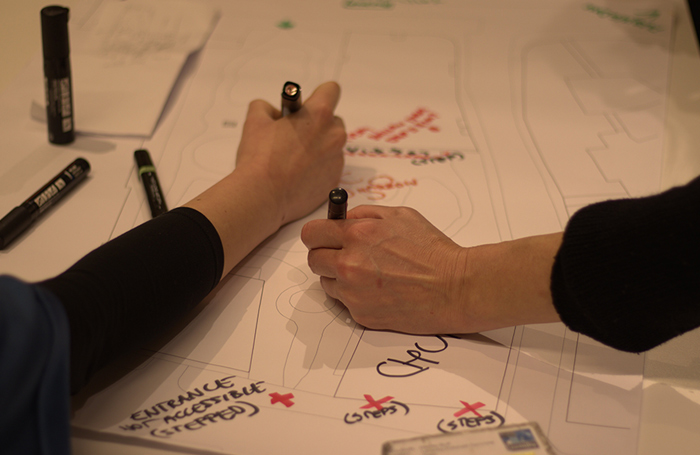What do you think is the most important issue for architects to focus on right now, and what are you doing as a practice to tackle it?
Since 2019, we have been radically practical in our approach, running initiatives and collaborative projects for students and creatives to understand circular solutions to real-world problems and give them the skills to become agents for sustainable change.
Throughout our three and a half years of practice we have worked with many peers and young professionals in schools and universities across the UK, to talk about materiality, locality, sustainability and circular economy. So naturally education and engagement became a massive part of our practice and how we worked with people. We have got involved in outreach and engagement projects such as The People’s Pavilion by Beyond the Box, to help young people think about their built environment and how it affects the communities they are growing up in.
Part of our approach in all of our talks, workshops or sessions is to always introduce the concept of sustainability early on in any project, no matter how big or small. This ensures that every design decision and detail from then on is made with this priority and mindset.
Much of the industry views sustainability as an afterthought, at which point it is often too late to make the needed design changes to ensure the building or project is truly and thoroughly sustainable. This can result in greenwashing which cheapens the worldwide view of what sustainability within the industry looks like and the work of few architects and designers who are working hard to pave a way to a sustainable industry.
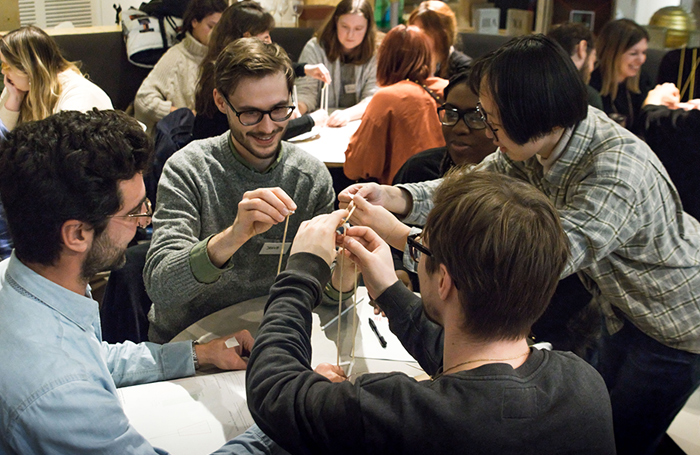
What benefits have you experienced from engaging with RIBA London?
RIBA London has been a key support for Re-Fabricate, introducing several of our founders and funding our first project, the Re-Fabricate Waste Reuse Challenge. Through our membership as individuals, we had access to RIBA events where we could meet like minded individuals, meet the RIBA London team and learn about funding opportunities at the RIBA for groups such as ours. The RIBA London team have been hugely supportive as we have developed as a collective, providing guidance and flagging opportunities to us. Since our origins, several other projects have been supported by the RIBA which has been key to our growth.
Re-Fabricate was founded on two motivations, firstly to provide a platform for young practising and studying architects and designers to engage with the wider themes and challenges of the profession, and secondly to bring sustainability and circular economy to the forefront of the architectural and construction industries priorities. Our work is ever evolving, nevertheless we haven’t veered far from these initial motivations and still strongly believe that these focuses are of the utmost importance.
In some ways it can be difficult to summarise benefits of a membership in a tangible way but for us, the connections we’ve made, guidance and support we’ve received and funding we’ve had access to has been imperative to our success.
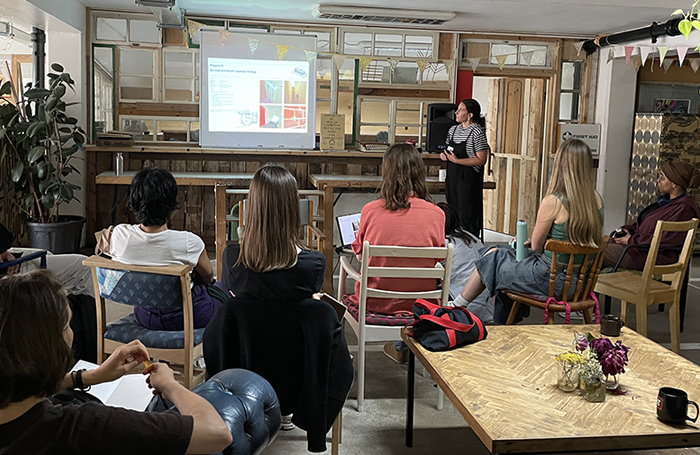
How do you incorporate environmental and social sustainability into your work?
Re-Fabricate formed largely due to the fact that we all individually recognised the lack of consideration attributed to environmental and social sustainability in practice. In response we see sustainability purposefully intertwined and intrinsically linked to every thought process and design decision we make. We continue to carefully consider projects and collaborations, ensuring that the outcomes respond to the promotion, education and representation of environmentally and socially sustainable architecture in the UK.
Throughout our work, we look to source recycled and waste materials to use in our making and modelling, encourage circular economy practice in all of our teaching, and promote local and natural building materials and their characteristics in all our engagements and collaborations as well as ordering vegan food and locally produced drinks, when we cater for our workshops.
This does not mean to say that we don’t face challenges, since 2019 we have constantly had to weigh up different choices, extensively research and get creative in order to figure out how we practically live out the ideals and standards we have set for ourselves within our context and means.
For example, on our project - Seats at the Table, we have struggled with obtaining sustainable, waterproof, long lasting signage and wayfinding tools for our outdoor installation. This has resulted in choosing to print on vinyl, a petrochemical based product. We are always learning and researching better ways to do even the most simple of things, such as printing. This is an example where compromises have been made, where our ideals have met real-world challenges.
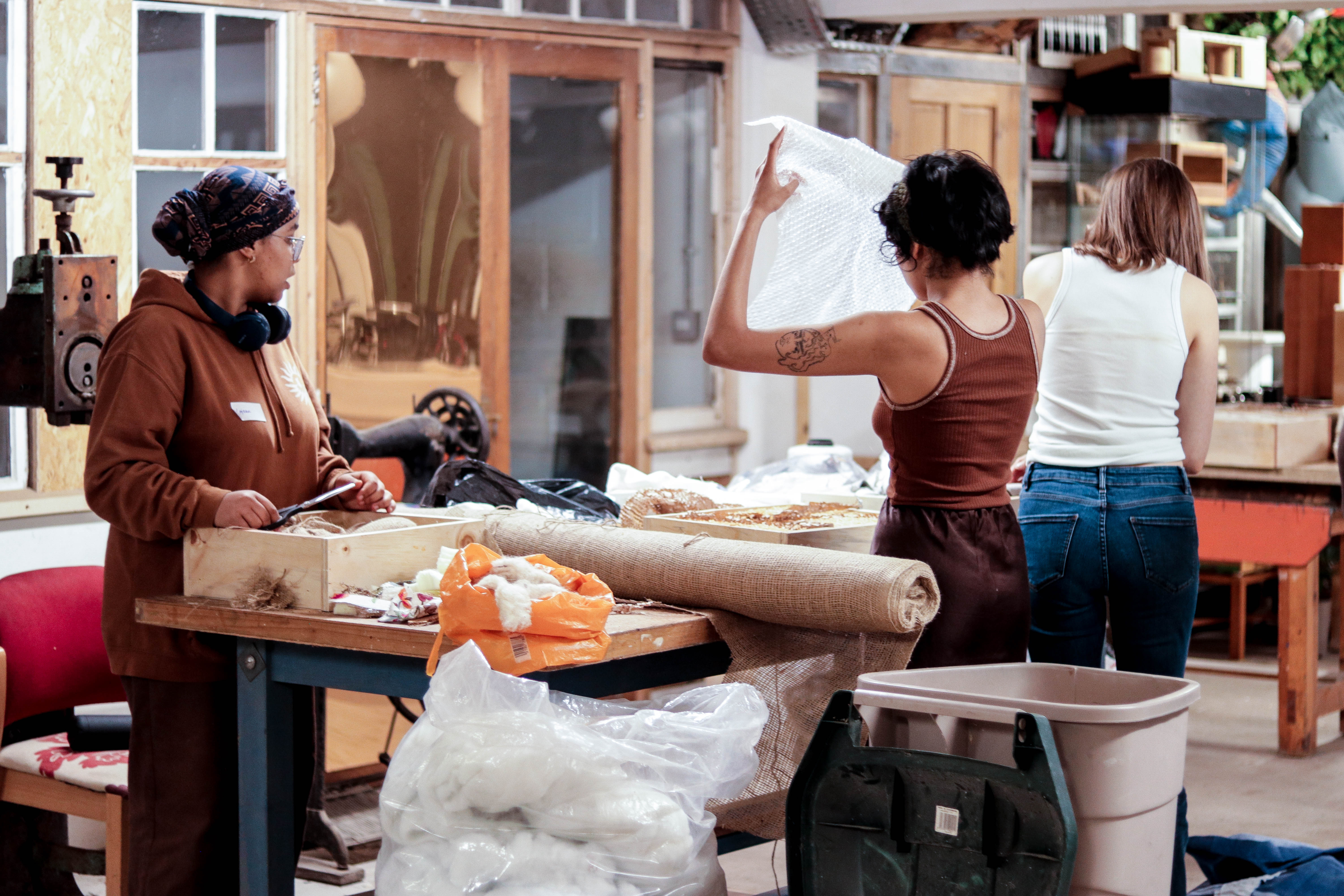
How do you think we can make architecture more accessible to people of all backgrounds?
Something we have realised since we began delivering workshops in schools is that we are often the first architectural professionals a student may have interacted with in their lives. Before this point, the idea of a career in architecture is not something they have considered purely due to lack of exposure to the profession. As well as teaching them about circular design, for the first time, we can discuss the built environment more generally and answer questions about careers in architecture.
Although the industry obviously has a lot of challenges for diversity such as the cost of education and at times, nepotism, if we can maximise the exposure of young people from diverse backgrounds to the profession as a whole, through initiatives such as RIBA’s Architecture Ambassadors, we can hopefully inspire a new generation to shape the future of buildings and the built environment as a whole.
OUR GOALS:
Making vital the circular economy principles in the construction and architectural industries
- Building a more sustainably competent workforce prepared to work towards a wasteless world
- Actively engaging everyone in the creation of our built environment
- Encouraging thought and interaction with the material world around us
- Providing accessible platforms and opportunities to enable further conversation and collaborations towards waste solutions
As well as running our own programmes we deliver workshops in and around the themes of sustainable design and circular economy in construction. These range from short online classes to research and design and build programmes spanning several months. Our work has no set parameters and we are always looking to get involved in new and exciting projects.
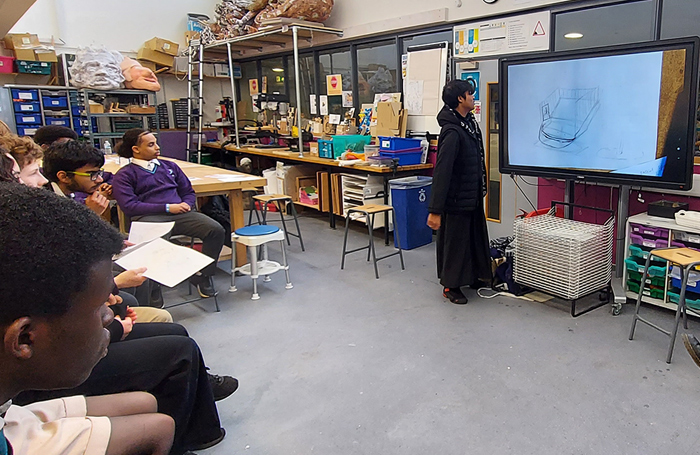
What is the biggest challenge you’ve overcome since you have started?
Since our first project in 2019, a constant challenge we come up against is making time for the work we do. All six directors have full-time day-jobs, across different parts of the UK. So we fit the work we do for Re-Fabricate around this, in the evenings, weekends and lunch breaks. This can be all-consuming, managing time between Re-Fabricate workshops and events, whilst still progressing our own career goals in construction, can easily lead to burning out.
In the same breath we recognise our privilege. Being able to spend this time working towards important goals is fulfilling and the support we have received till this point from mentors, peers, and organisations is invaluable to where we are today.
As we become more established, and rolling into our 3rd year of work we would love to have more agency to be able to carve out time which maintains a sustainable and healthy balanced work/life style.
What do you think is the role of communities in a more sustainable architecture?
Ensuring buildings truly serve the needs of the communities that host them results in socially durable buildings with longer lives, ensuring the embodied carbon initially invested in the construction works is maximised in the social value it provides.
Delivering effective community and user engagement from the very beginnings of a project enables the architect and client to ensure the building is as usable as possible for years to come. Re-Fabricate has worked with several engagement based organisations including Beyond the Box and the Dis/Ordinary Architecture Project, all focused on bringing different social groups into the dialogue around what we build in our cities. Maximising these practices throughout the profession and wider industry is vital to ensure we are creating and adapting buildings that benefit communities. This in turn will create buildings with long, functional lives rather than unsustainably demolishing and rebuilding.
